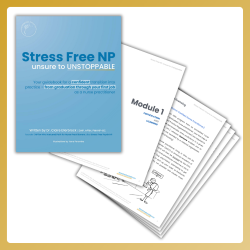I’ve been a psych NP for the past 7 years and have had the opportunity to work in many different settings. Mostly because I’m really curious about what mental health treatment looks like in different places (for patients and for NPs).
This curiosity has led me to different states where I’ve worked as a travel NP, and also locally in different types of settings – community mental health, addiction, eating disorders, private practice (my own and others), telehealth…
Over the years I’ve come away with 7 tips that have helped me, regardless of where I was working. Some are deceptively simple, but they’ve all come in handy and are good reminders, if anything, at keeping me organized and efficient.
💡7 pro tips of practice
1. I learned this tip from my first collaborating psychiatrist when I was a new psych NP. He taught me to “treat disorders not symptoms”.
Symptoms are just indicators of how well the diagnosis is being treated. You need to have an evidence-based plan for how a disorder is being treated. Find out the diagnosis, then treat it in an evidence-based way. Don’t just treat symptoms.
2. You’re not required to prescribe medications on the initial visit with a patient.
You’re collecting information, developing a diagnosis, and potentially gathering more information (ie ordering labwork, tracking down previous records, obtaining collateral information). It can be considered negligent to just prescribe without having the information you need. Don’t feel pressured to prescribe right away.
3. Start one medication at a time.
Prescribing only one medication at a time allows you to check for efficacy/side effects etc. If you prescribe multiple medications at once and you patient is doing better (or worse) on a follow up visit, it will be difficult to know why. Explain this rationale to your patient as well so you’re providing transparency and agency to them.
4. Be mindful of the words you say and the language you use in documentation.
For example, a patient is not a “schizophrenic” they are a patient with schizophrenia. Similarly, you do not say or write, “a heroin addict” or a “drug addict” but a person with opiate use disorder. Words have meaning and are powerful; carefully consider the ones you use.
5. The “Risk Assessment” section of a note is one of the most critical parts of a note for a psychiatric provider; it’s meant to assess a patient’s safety and to acknowledge how you’re mitigating these risk factors.
Patient safety is one of the most important parts of our jobs as psychiatric providers; the risk assessment section outlines the plan of safety at each visit. If you’re wanting to ensure you’re including all the necessary components while charting, or want more streamlined templates, grab my Psychiatric Templates Bundle.
6. Develop a safe, non-judgmental, friendly rapport with your patients.
The vulnerability patients share as they talk about their mental health with you requires a certain environment. In the mental health specialty, more than any other, your respect and creation of a safe, supportive environment is so incredibly important. You will earn and develop trust from your patient over time.
7. Information is not owed to you.
Remember, your patient is choosing to share with you, and that is something not to take for granted. To demonstrate your understanding of this, you can remind your patients to only share what they feel comfortable sharing and if there are questions they’re not comfortable answering at this time, that’s ok. I often say this before asking more sensitive information, and at the beginning of initial visits when I’m doing an initial psych eval.
So that’s it! These pro tips of practice have kept me grounded with providing high quality, efficient patient care.
For those of you who want more clinical tips on practice and want to learn a structured framework for more effectively diagnosing and treating your patients with mental health needs, check out my free training.
And for NP students and new grads who want more clarity on what lies ahead from getting board certified to landing your first job with a solid offer contract, check out my guide to move from unsure to unstoppable.


